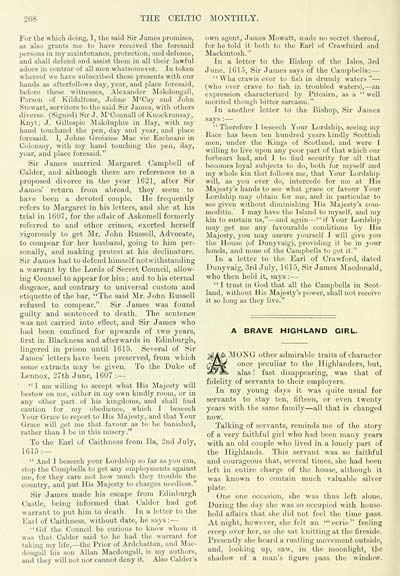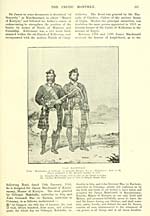Blair Collection > Celtic monthly > Volume 2, 1894
(248)
Download files
Complete book:
Individual page:
Thumbnail gallery: Grid view | List view

208
^THE CELTIC MONTHLY.
Fur the wliich doing, 1, the said Sir James promises,
ivs also grants me to have received the foresaid
persons in my maintenance, protection, and defence,
and sliall defend and assist them in all their lawful
adoes in contrar of all men whatsomever. In token
whereof we have subscribed these presents with our
liaiids as afterfoUows day, year, and place foresaid,
before these witnesses, Alexander Makdongall,
Parson of Kildaltone, Johne M'Cay and John
Stewart, servitors to the said Sir James, with others
diverse. (Signed) Sir J. M'Connall of Knockransay,
Knyt; J. Gillespie Makduphie in Hay, with my
hand touchand the pen, day and year, and place
foresaid. I, Johne Groiame Mac vie Eacheane in
Colonsay, ^vith my hand touching the pen, day,
year, and place foresaid. '"
Sir James married Margaret Campbell of
Calder, and although there are references to a
proposed divorce in the year 1621, after Sir
James' return from abroad, they seem to
have been a devoted couple. He frequently
refers to Margaret in his letters, and she at his
trial in 1607, for the affair of Askomell formerly
referred to and other crimes, exerted herself
vigorously to get Mr. John Russell, Advocate,
to compear for her husband, going to him per-
sonally, and making protest at his declinature.
Sir James had to defend himself notwithstanding
a warrant by the Lords of Secret Council, allow-
ing Counsel to appear for him ; and to his eternal
disgrace, and contrary to universal custom and
etiquette of the bar, "The said Mr. John Russell
refused to compear." Sir James was found
guilty and sentenced to death. The sentence
was not carried into etfect, and Sir James who
had been confined for upwards of two years,
first in Blackness and afterwards in Edinburgh,
lingered in prison until 1615. Several of Sir
James' letters have been preserved, from which
some extracts may be given. To the Duke of
l^ennox, 27th June, 1607 : —
"I am willing to accept what His jSIajesty will
bestow on me, either in my own kindly room, or in
any other part of his kingdoms, and shall find
caution for my obedience, which I beseech
>'our Grace to report to His Majesty, and that Yoiu:
(irace will get me that favour as to be banished,
rather than I be in this misery."
To the Earl of Caithness from 11a, "Jud July,
1615:—
" And I beseech your Lordship so far as you can,
stop the Campbells to get any euiiiloymunts against
me, for they care not how much they trouble the
country, and put His Majesty to charges needless."
Sir James made his escape from Edinburgh
Castle, being informed that ('alder had got
warrant to ])Ul liim to death in a letter to the
ivii 1 of Caithness, without date, he says : —
"(iif the Council be curious to know whom it
Has that Calder said to he had the warrant for
taking my life,— the Prior of Ardchattan, and Mac-
(lougull his son Allan Macdougall, is my authors,
and they will not nor cannot deny it. Also Caldor's
own agent, James Mowatt, made no secret thereof,
for he told it both to the Earl of Crawfuird and
Mackintosh."
In a letter to the Bisliop of the Isles, 3rd
June, 1615, Sir James says of the Campbells: —
' ' Wha crawis ever to fish in drumly waters " —
(who ever crave to fish in troubled waters), — an
expression characterized by Pitcairn, as a "well
merited though bitter sarcasm."
In another letter to the Bishop, Sir James
says : —
" Therefore I beseech Your Lordship, seeing my
Race has been ten hundred years kindly Scottish
men, under the Kings of Scotland, and were 1
willing to live upon any poor part of that which our
forbears had, and 1 to find secm-ity for all that
becomes loyal subjects to do, both for myself and
my whole kin that follows me, that Your Lordship
will, as you ever do, intercede for me at His
Majesty's hands to see what grace or favour Your
Lordship may obtain for me, and in particular to
see given without diminishing His Majesty's com-
moditie. T may have the Island to myself, ami my
kin to sustain ns," — and again — " if Your Lordship
may get me any favourable conditions by His
Majesty, you may assure yourself I will give you
the House (of Dunyvaig), providing it be in your
hands, and none of the Campbells to get it."
In a letter to the Earl of Crawford, dated
Dunyvaig, 3rd July, 1615, Sir James Macdonald,
who then held it, says : —
"1 trust in God that all the Campbells in Scot-
land, without His Majesty's power, shall not receive
it so long as they live."
A BRAVE HIGHLAND GIRL.
MJ^ MONG other admirable traits of character
^j^MT once peculiar to the Highlanders, but,
<^J^=s alas ! fast disappearing, was tliat of
fidelity of servants to their employers.
In my young days it was quite usual for
servants to stay ten, fifteen, or even twenty
years with the same family — all that is changed
now.
Talking of servants, reminds me of tlie story
of a very faithful girl who had l)cen many years
witii an old couple who lived in a lonely part of
the Highlands. This servant was so faithful
and courageous that, several times, she had been
left in entire charge of the house, although it
was known to contain much valuable silver
plate.
One one occasion, she was thus left alone.
During the tlav she was so occupied with house-
hold ail'airs that she did not feel the time pass.
At night, however, she felr an '"eerie" feeling
creep over lier, as .siie sat knitting at the lireside.
Presently siie heard a rustling movement outside,
and, looking up, saw, in the moonlight, t|ie
shadow of a man's figure pass the window.
^THE CELTIC MONTHLY.
Fur the wliich doing, 1, the said Sir James promises,
ivs also grants me to have received the foresaid
persons in my maintenance, protection, and defence,
and sliall defend and assist them in all their lawful
adoes in contrar of all men whatsomever. In token
whereof we have subscribed these presents with our
liaiids as afterfoUows day, year, and place foresaid,
before these witnesses, Alexander Makdongall,
Parson of Kildaltone, Johne M'Cay and John
Stewart, servitors to the said Sir James, with others
diverse. (Signed) Sir J. M'Connall of Knockransay,
Knyt; J. Gillespie Makduphie in Hay, with my
hand touchand the pen, day and year, and place
foresaid. I, Johne Groiame Mac vie Eacheane in
Colonsay, ^vith my hand touching the pen, day,
year, and place foresaid. '"
Sir James married Margaret Campbell of
Calder, and although there are references to a
proposed divorce in the year 1621, after Sir
James' return from abroad, they seem to
have been a devoted couple. He frequently
refers to Margaret in his letters, and she at his
trial in 1607, for the affair of Askomell formerly
referred to and other crimes, exerted herself
vigorously to get Mr. John Russell, Advocate,
to compear for her husband, going to him per-
sonally, and making protest at his declinature.
Sir James had to defend himself notwithstanding
a warrant by the Lords of Secret Council, allow-
ing Counsel to appear for him ; and to his eternal
disgrace, and contrary to universal custom and
etiquette of the bar, "The said Mr. John Russell
refused to compear." Sir James was found
guilty and sentenced to death. The sentence
was not carried into etfect, and Sir James who
had been confined for upwards of two years,
first in Blackness and afterwards in Edinburgh,
lingered in prison until 1615. Several of Sir
James' letters have been preserved, from which
some extracts may be given. To the Duke of
l^ennox, 27th June, 1607 : —
"I am willing to accept what His jSIajesty will
bestow on me, either in my own kindly room, or in
any other part of his kingdoms, and shall find
caution for my obedience, which I beseech
>'our Grace to report to His Majesty, and that Yoiu:
(irace will get me that favour as to be banished,
rather than I be in this misery."
To the Earl of Caithness from 11a, "Jud July,
1615:—
" And I beseech your Lordship so far as you can,
stop the Campbells to get any euiiiloymunts against
me, for they care not how much they trouble the
country, and put His Majesty to charges needless."
Sir James made his escape from Edinburgh
Castle, being informed that ('alder had got
warrant to ])Ul liim to death in a letter to the
ivii 1 of Caithness, without date, he says : —
"(iif the Council be curious to know whom it
Has that Calder said to he had the warrant for
taking my life,— the Prior of Ardchattan, and Mac-
(lougull his son Allan Macdougall, is my authors,
and they will not nor cannot deny it. Also Caldor's
own agent, James Mowatt, made no secret thereof,
for he told it both to the Earl of Crawfuird and
Mackintosh."
In a letter to the Bisliop of the Isles, 3rd
June, 1615, Sir James says of the Campbells: —
' ' Wha crawis ever to fish in drumly waters " —
(who ever crave to fish in troubled waters), — an
expression characterized by Pitcairn, as a "well
merited though bitter sarcasm."
In another letter to the Bishop, Sir James
says : —
" Therefore I beseech Your Lordship, seeing my
Race has been ten hundred years kindly Scottish
men, under the Kings of Scotland, and were 1
willing to live upon any poor part of that which our
forbears had, and 1 to find secm-ity for all that
becomes loyal subjects to do, both for myself and
my whole kin that follows me, that Your Lordship
will, as you ever do, intercede for me at His
Majesty's hands to see what grace or favour Your
Lordship may obtain for me, and in particular to
see given without diminishing His Majesty's com-
moditie. T may have the Island to myself, ami my
kin to sustain ns," — and again — " if Your Lordship
may get me any favourable conditions by His
Majesty, you may assure yourself I will give you
the House (of Dunyvaig), providing it be in your
hands, and none of the Campbells to get it."
In a letter to the Earl of Crawford, dated
Dunyvaig, 3rd July, 1615, Sir James Macdonald,
who then held it, says : —
"1 trust in God that all the Campbells in Scot-
land, without His Majesty's power, shall not receive
it so long as they live."
A BRAVE HIGHLAND GIRL.
MJ^ MONG other admirable traits of character
^j^MT once peculiar to the Highlanders, but,
<^J^=s alas ! fast disappearing, was tliat of
fidelity of servants to their employers.
In my young days it was quite usual for
servants to stay ten, fifteen, or even twenty
years with the same family — all that is changed
now.
Talking of servants, reminds me of tlie story
of a very faithful girl who had l)cen many years
witii an old couple who lived in a lonely part of
the Highlands. This servant was so faithful
and courageous that, several times, she had been
left in entire charge of the house, although it
was known to contain much valuable silver
plate.
One one occasion, she was thus left alone.
During the tlav she was so occupied with house-
hold ail'airs that she did not feel the time pass.
At night, however, she felr an '"eerie" feeling
creep over lier, as .siie sat knitting at the lireside.
Presently siie heard a rustling movement outside,
and, looking up, saw, in the moonlight, t|ie
shadow of a man's figure pass the window.
Set display mode to: Large image | Transcription
Images and transcriptions on this page, including medium image downloads, may be used under the Creative Commons Attribution 4.0 International Licence unless otherwise stated. ![]()
| Early Gaelic Book Collections > Blair Collection > Celtic monthly > Volume 2, 1894 > (248) |
|---|
| Permanent URL | https://digital.nls.uk/75846628 |
|---|
| Shelfmark | Blair.55 |
|---|---|
| Additional NLS resources: | |
| Attribution and copyright: |
|
| Description | A selection of books from a collection of more than 500 titles, mostly on religious and literary topics. Also includes some material dealing with other Celtic languages and societies. Collection created towards the end of the 19th century by Lady Evelyn Stewart Murray. |
|---|
| Description | Selected items from five 'Special and Named Printed Collections'. Includes books in Gaelic and other Celtic languages, works about the Gaels, their languages, literature, culture and history. |
|---|

